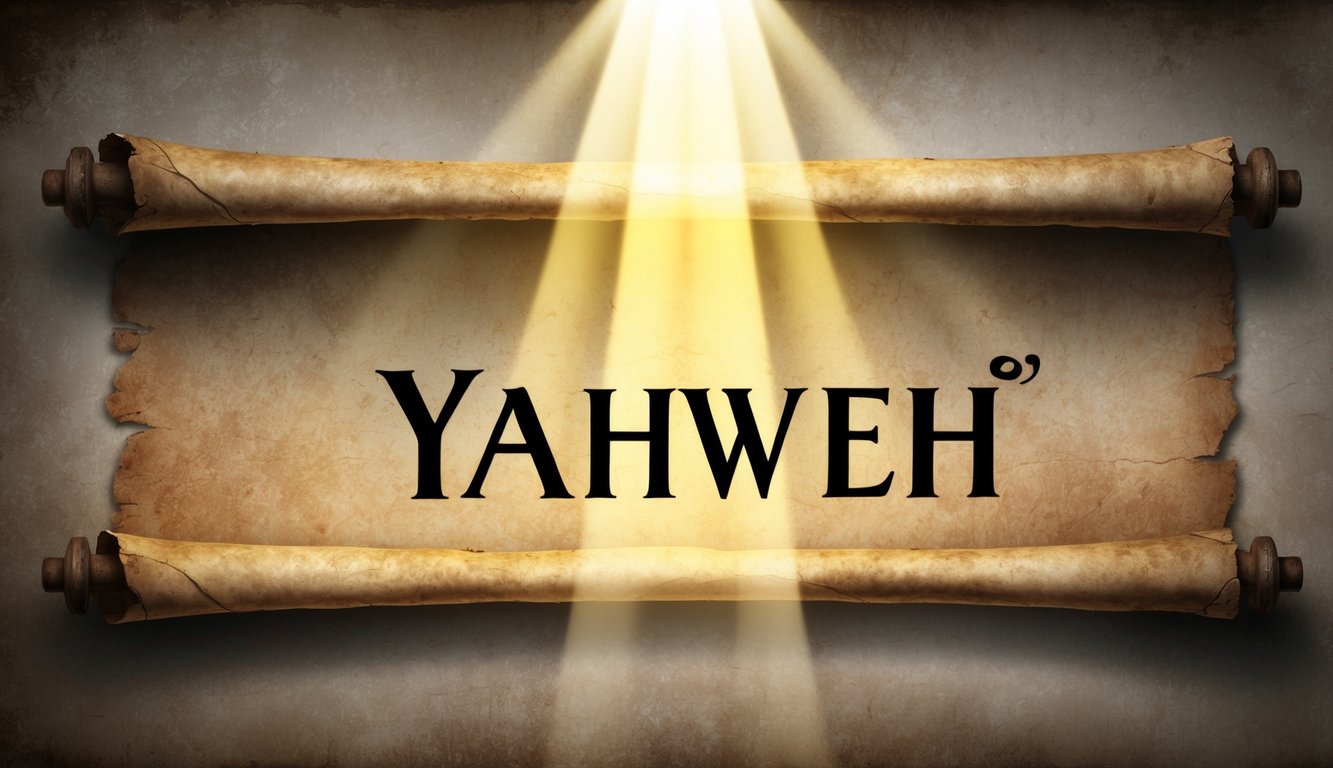Don’t Miss Out On This Unique Astrological Opportunity
Are you tired of spinning your wheels and getting nowhere? Simply put, you’re out of sync: you’re out of alignment with your astral configuration.
But: there’s a kind of map that can help you reclaim your alignment. Think of it as your own personal blueprint to success and happiness: a blueprint that will help you live your most amazing life.
Get started here.
The name Yahweh holds a special place in religious texts, especially in the Hebrew Bible, where it represents the divine name for God. Yahweh is derived from the Hebrew term YHWH, which means “to be,” emphasizing the eternal and unchanging nature of God. This naming serves as a cornerstone in understanding biblical narratives and theological discussions.
In the Old Testament, Yahweh is often portrayed as the singular, sovereign God, distinct from other deities mentioned as “el” or “ri.” These portrayals offer a rich insight into the ancient world’s view of divinity and the unique identity ascribed to Yahweh in comparison to other gods.
The cultural and historical context of Yahweh also highlights how people in ancient times perceived their relationship with the divine.
As you explore further, you will see how this name shaped religious practices and beliefs throughout history.
The significance of Yahweh transcends mere pronunciation or etymology, influencing not just theology but also the cultural development of societies that included the Hebrew Scriptures in their belief systems.
Key Takeaways
- Yahweh means “to be” and highlights the eternal nature of God.
- The name Yahweh distinguishes God from other deities in the Old Testament.
- Yahweh has deep theological and cultural importance in biblical traditions.
Etymology and Pronunciation
When looking at Yahweh’s meaning, knowing the historical roots and changes in how to say it can help.
Historians and linguists study the Hebrew name’s journey to its modern pronunciation and meaning.
Historical Development
Yahweh is a proper name found in ancient Hebrew texts.
Its origin lies in the Semitic language family.
The name appears often in the Hebrew Bible.
In early Judaism, it was crucial to everyday life and spirituality.
The name’s significance evolved over time, adapting to various cultures and languages.
Greek translations, such as the Septuagint, used “Kyrios” to refer to this name, reflecting changes as the name spread.
Over time, the Tetragrammaton took center stage in both religious practices and academic works.
Tetragrammaton
Consisting of four Hebrew letters—YHWH—this term is the “Tetragrammaton.” These letters represent the divine name of Yahweh.
Because Hebrew originally did not include vowels, the exact pronunciation is not clear.
This made ancient Hebrew names notably challenging to vocalize accurately.
Religious tradition considers the Tetragrammaton sacred.
It is often replaced with “Adonai” in Judaism during readings to show respect.
Latin translations later gave rise to Jehovah, adding to the many ways to express this significant name.
Vocalization and Translation
The pronunciation of Yahweh has sparked much debate.
Scholars have examined ways to match the Hebrew letters with various sounds.
Since the Hebrew text lacked vowels, different vowels were inserted later, leading to forms like “Jehovah.”
Translation practices over centuries have further complicated things.
Understanding how “Adonai” and “Kyrios” are used helps reveal how deeply the meanings changed in different languages.
Many dictionaries now guide pronunciation and translation, linking historical roots to modern-day understandings.
Yahweh in Biblical Traditions
Yahweh plays a central role in biblical narratives, from His covenant with the patriarchs to His connections with Moses and prophetic promises of the Messiah.
These traditions provide crucial insights into the spiritual and historical contexts of the Hebrew Scriptures.
Covenant with the Patriarchs
The covenant between Yahweh and the patriarchs—Abraham, Isaac, and Jacob—stands as a foundational aspect of biblical traditions.
Yahweh promised them land, descendants, and blessings, making a commitment that would extend across generations.
This covenant can be seen in multiple biblical accounts where Yahweh reveals Himself as “I am,” expressing a personal and enduring relationship with His people.
The covenant with the patriarchs emphasizes faith and obedience.
Abraham’s willingness to follow Yahweh, even without knowing his destination, is a pivotal moment.
This relationship showcases Yahweh’s role as a guiding and protective force.
Additionally, Yahweh’s promises to Abraham form a pattern repeated with Isaac and Jacob, reinforcing the continuation of His covenant through their lives and the unfolding of biblical history.
Exodus and Moses
The Book of Exodus highlights Yahweh’s role in liberating the Israelites from Egyptian bondage.
Through Moses, Yahweh performs dramatic signs, like the plagues, to demonstrate His power and authority over creation.
Moses’ interactions with Yahweh at the burning bush introduce the divine name, “I Am,” symbolizing eternal presence and commitment.
In this narrative, Yahweh gives the Israelites the Ten Commandments at Mount Sinai, establishing a covenant that defines their identity and laws.
This event marks a turning point, where the Israelites transition from slaves to a nation under Yahweh’s guidance.
Deuteronomy further reinforces this relationship, with Moses reiterating Yahweh’s commandments and emphasizing adherence to His laws as essential for prosperity and favor.
Messiah and Prophecy
Yahweh’s promises extend to the prophetic visions of a coming Messiah, often seen as fulfilled in the life and work of Jesus.
In the Hebrew Scriptures, prophets like Isaiah speak of a future leader who will bring peace and justice.
These prophecies carry deep significance for both Jewish and Christian traditions.
The idea of a Messiah illustrates Yahweh’s plan for redemption and hope across the ages.
Prophecies highlight Yahweh’s ongoing relationship with humanity, ensuring His involvement in history.
The Old Testament’s messianic predictions create a bridge between Yahweh’s covenant with His people and the anticipated renewal through divine intervention.
Theological Significance

Yahweh holds a deep theological meaning, highlighting His role not only as the God of Israel but also as a creator, eternal being, and authority figure.
This section explores how Yahweh’s attributes influence His followers and details His worship practices.
God of Israel and Beyond
Yahweh is often recognized as the God of Israel, forming a key part of the nation’s identity.
He is more than just a deity for a single group; Yahweh is seen as the creator and eternal lord of all things.
This challenges the boundaries, extending His influence beyond the Israelites.
His actions in the Hebrew scriptures underscore His power and authority, making Him a figure of ultimate justice and truth.
Yahweh is not just limited to Israel but is a relational God with a universal mission.
Attributes and Nature
Yahweh exhibits attributes that make Him unique among gods.
He is self-existent and not created by anything else.
This characteristic emphasizes His eternal nature.
Yahweh is described as a judge who embodies justice and truth, ensuring that moral order is upheld.
The relationship between Yahweh and reality is centered on laws that promote beauty and fairness.
Understanding Yahweh’s attributes helps clarify His role as both a powerful force and a deeply relational God, involved in the lives of His people.
Worship and Representation
Worship practices dedicated to Yahweh are key in understanding His divine authority and beauty.
These practices often take place in temples, where His presence is believed to be most potent.
Yahweh’s representation in ritual emphasizes His role as the omnipotent God.
The Hebrew people regarded Him as both a creator and a personal God, acknowledging His supreme authority.
Worship is a way to connect deeply with His justice and truth, ensuring that followers live by His divine laws.
Each ritual performed reflects Yahweh’s position at the center of religious life, guiding the faithful through a life of righteousness.
Cultural and Historical Context

Yahweh’s meaning is shaped by various cultural and historical influences.
From the early worship in Canaan to changes during the Babylonian Exile, and the evolution in the post-Exilic period, each phase contributed to its development.
Pre-Exilic and Exilic Periods
Yahweh’s origins likely trace back to the Iron Age, with early worshipers potentially in regions like Midian and Nubia.
During the time of the Babylonian Exile, the Hebrew Bible reflects shifts in how Yahweh was perceived.
Important texts from this era emphasize monotheism, contrasting earlier polytheistic practices.
The Babylonian Captivity, marked by the destruction of the First Temple, led to profound changes.
Jewish communities in Babylon were cut off from the traditional worship practiced in Samaria and the Levant. Exile narratives in the Hebrew Bible established Yahweh as the sole deity, shaping the faith significantly.
Canaanite Influence and Syncretism
Early Yahweh worship was influenced by Canaanite traditions. Canaanite gods, like Baal and El Shaddai, show similarities in characteristics.
Yahweh, seen as a storm god, mirrors traits found in the Canaanite god Baal.
There is evidence in ancient texts that Yahweh may have been worshiped alongside Asherah, a Canaanite goddess.
During Samuel’s time, this syncretism is visible, as many Israelites held onto older practices.
The Song of Deborah also reveals these influences, highlighting the complex relationship between Yahweh and other deities.
Over time, breaking away from Canaanite gods became crucial for distinguishing Yahweh worship from other religious practices in the region.
Post-Exilic Developments
After the Babylonian Exile, during the Second Temple period, the practice and understanding of Yahweh worship consolidated.
Following the return to Jerusalem, reconstruction efforts allowed for the emergence of a new religious identity.
The post-exilic community focused on Yahweh as central, moving further away from polytheistic influences.
Texts from the English Bible show the emphasis on Yahweh’s uniqueness.
As the community reestablished itself, ecclesiastical laws and practices were refined.
As a result, worship and theology transformed, providing continuity and unity for the people.
By the time of Amenhotep III’s rule over Samaria, this new Yahweh-centered worship was firmly established.
Frequently Asked Questions

The name Yahweh holds significant importance in the Bible as it is deeply tied to the identity of God.
This section explores various aspects of Yahweh, including its biblical significance, connection to other scriptural concepts, and pronunciation challenges.
Throughout history, the name Yahweh has been regarded as sacred, often replaced with titles like “Lord” to show reverence.
In modern translations, the amplified Bible meaning of Yahweh provides deeper insight by expanding on its implications in different contexts.
Understanding this name enhances one’s appreciation of God’s character and His relationship with His people.
What is the significance of the name Yahweh in the Bible?
Yahweh is the personal name of God in the Hebrew Bible.
It signifies God’s eternal presence and his role as the creator and sustainer of life.
This name is revered as a symbol of God’s power and covenant with the people of Israel.
How is Yahweh related to the concept of ‘I am’ in scriptural texts?
The name Yahweh is linked to the phrase “I am who I am,” which appears in the Book of Exodus.
This connection highlights God’s self-existence and timeless nature, emphasizing his role as the unchanging and ever-present deity who defines existence itself.
What are the reasons behind the traditional prohibition of vocalizing the name Yahweh?
Traditionally, the name Yahweh was not spoken to show reverence and respect for its sanctity.
Ancient Jewish practices avoided vocalizing it, using terms like “Adonai” instead.
This was meant to prevent misuse and ensure the holiness of God’s name was preserved.
How does the term Yahweh differ from Jehovah in its linguistic and religious context?
Yahweh and Jehovah represent the same Hebrew name for God, YHWH.
The English representation “Jehovah” arose from combining the consonants YHWH with the vowels of Adonai.
Meanwhile, Yahweh more closely reflects the original Hebrew pronunciation and is favored in scholarly contexts.
In what way does the meaning of Yahweh connect to the identity of Jesus in Christian theology?
In Christian theology, Yahweh is often associated with Jesus, who is considered the incarnation of God.
The connection involves seeing Jesus as the embodiment of God’s eternal presence and promises.
This gives Christians a personal relationship with Yahweh through Christ.
What are the correct pronunciation and phonetic intricacies of the tetragrammaton YHWH?
The tetragrammaton YHWH has lost its pronunciation over time.
Scholars generally agree on “Yahweh” as a likely pronunciation, but due to ancient Hebrew lacking vowels, this remains a scholarly reconstruction.
The emphasis on its holiness further complicates attempts to determine one correct pronunciation.



